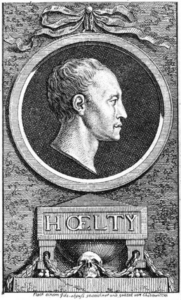The time of boyhood
(Poet's title: Die Knabenzeit)
Set by Schubert:
D 400
[May 13, 1816]
Wie glücklich, wem das Knabenkleid
Noch um die Schultern fliegt!
Nie lästert er der bösen Zeit,
Stets munter und vergnügt.
Das hölzerne Husarenschwert
Belustiget ihn itzt,
Der Kreisel und das Steckenpferd,
Auf dem er herrisch sitzt.
Und schwinget er durch blaue Luft
Den buntgestreiften Ball,
So achtet er nicht Blütenduft,
Nicht Lerch und Nachtigall.
Nichts trübt ihm, nichts in weiter Welt,
Sein heitres Angesicht,
Als wenn sein Ball ins Wasser fällt,
Als wenn sein Schwert zerbricht.
O Knabe, spiel und laufe nur,
Den lieben langen Tag
Durch Garten und durch grüne Flur
Den Schmetterlingen nach.
Bald schwitzest du, nicht immer froh,
Im engen Kämmerlein,
Und lernst vom dicken Cicero
Verschimmeltes Latein!
How lucky he is, he whose boy’s clothes
Still hang from his shoulders!
He never curses this awful time,
He is always jolly and contented.
The wooden Hussar’s sword
Still gives him pleasure,
As do the spinning top and the toy horse
Which he sits on in such a lordly way.
And when he throws his ball through the blue air,
His brightly striped ball,
He does not notice the scent of the blossoms
Or the lark and the nightingale.
Nothing disturbs him, nothing in the wide world
Will affect his cheerful face,
Except when his ball falls in the water
Or if his sword gets broken.
Oh lad, just play and run around
For the whole happy day,
Go through the gardens and across the green fields
In pursuit of butterflies.
You will soon be sweating, you won’t always be cheerful,
You will be in a narrow little room
Learning from a big fat volume of Cicero,
Studying mouldy Latin.
All translations into English that appear on this website, unless otherwise stated, are by Malcolm Wren. You are free to use them on condition that you acknowledge Malcolm Wren as the translator and schubertsong.uk as the source. Unless otherwise stated, the comments and essays that appear after the texts and translations are by Malcolm Wren and are © Copyright.
☙
Themes and images in this text:
Air Balls Blue Books Breaking and shattering Butterflies and moths Children and childhood Clothes Fields and meadows Flowers Games and play Gardens Green Horses Larks Nightingales, Philomel Running and races Shoulders Smells Sweat Swords and daggers
Needless to say, this is an adult’s view of childhood. It has all of the arrogance of those who dismiss the child’s losses and concerns as nothing compared to what is in store. Such people probably think that a bit of pain and loss will toughen the kid up and make a man of him. It also projects the author’s own unhappy experience of learning Latin onto other people, an attitude that has led to so many young people now being denied the opportunity to gain access to the classical world. Who is to say that this boy might not turn out to relish his reading of Cicero and want to become a fine orator, lawyer or politician in his turn? Anyway, if the lad is genuinely interested in butterflies, he will need some Latin so that he can identify and classify them.

https://commons.wikimedia.org/wiki/File:Hobby_horse_(6012490195).jpg
☙
Original Spelling and note on the text Die Knabenzeit Wie glücklich, wem das Knabenkleid Noch um die Schultern fliegt! Nie lästert er der bösen1 Zeit, Stets munter und vergnügt. Das hölzerne Husarenschwert Belustiget ihn itzt, Der Kreisel und das Steckenpferd, Auf dem er herrisch sitzt. Und schwinget er durch blaue Luft Den buntgestreiften Ball; So achtet er nicht Blüthenduft, Nicht Lerch' und Nachtigall. Nichts trübt ihm, nichts in weiter Welt, Sein heitres Angesicht, Als wenn sein Ball ins Wasser fällt, Als wenn sein Schwert zerbricht. O Knabe, spiel' und laufe nur, Den lieben langen Tag, Durch Garten und durch grüne Flur Den Schmetterlingen nach. Bald schwitzest du, nicht immer froh, Im engen Kämmerlein, Und lernst vom dicken Cicero Verschimmeltes Latein! 1 Schubert changed 'die böse' to 'der bösen Zeit'
Hölty’s original was as follows (but Schubert could not have known it):
Wie glücklich, wem das Knabenkleid Noch um die Schultern fliegt, Wem lächelnde Zufriedenheit Den jungen Busen wiegt. Der Kräusel, und das Steckenpferd, Auf dem er herrisch sitzt, Das hölzerne Husarenschwert Belustigen ihn itzt. Den Ball, des Knaben Busenfreund, Der durch die Lüfte rollt, Sobald der Blumenmond erscheint, Vertauscht' er nicht um Gold. Nie mahlt der Harm, die Pest der Welt, Sein blühendes Gesicht, Als wenn sein Ball ins Waßer fällt, Als wenn sein Schwert zerbricht. Er hüpfet oft, vom Schweiße naß, Den halben Sommertag, Im Garten, durch das bunte Graß, Den Schmetterlingen nach. So spielt er, bis das Mittagsbrodt Ihn in die Stube winkt, Und tändelt, bis das Abendroth Durch Silberwolken blinkt. Vergnügen hüpft um ihn herum, Wenn Morpheus Mohn verstreut, Er tanzet in Elisium, Beglückte Knabenzeit!
Confirmed with Ludwig Christoph Heinrich Hölty’s Sämtliche Werke kritisch und chronologisch herausgegeben von Wilhelm Michael, Erster Band, Weimar, Gesellschaft der Bibliophilen, 1914, page 38.
Confirmed by Peter Rastl with Schubert’s source, Gedichte von L. H. Ch. Hölty. Neu besorgt und vermehrt von Johann Heinrich Voß. Wien, 1815. Bey Chr. Kaulfuß und C. Armbruster. Gedruckt bey Anton Strauß. Meisterwerke deutscher Dichter und Prosaisten. Drittes Bändchen. pages 112-113; with Gedichte von L. H. Ch. Hölty. Neu besorgt und vermehrt von Johann Heinrich Voß. Wien, 1815. Bey Chr. Kaulfuß und C. Armbruster. Gedruckt bey Anton Strauß, pages 112-113; and with Gedichte von Ludewig Heinrich Christoph Hölty. Neu besorgt und vermehrt von Johann Heinrich Voss. Hamburg, bei Carl Ernst Bohn. 1804, pages 139-140.
To see an early edition of the text, go to page 112 [190 von 300] here: http://digital.onb.ac.at/OnbViewer/viewer.faces?doc=ABO_%2BZ15769170X


